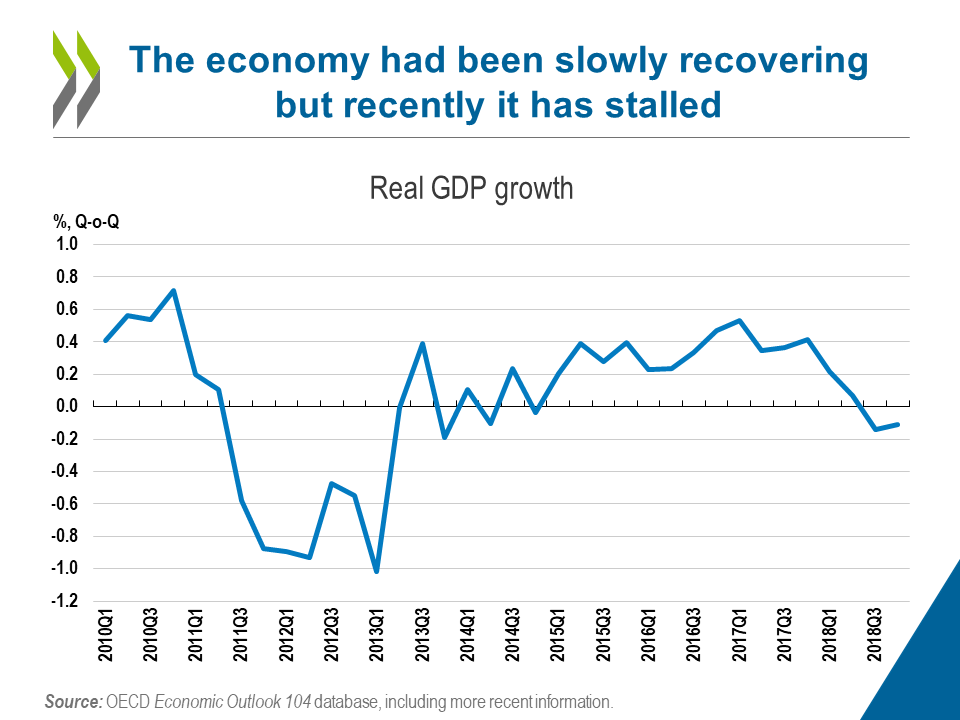How Tariff Volatility Is Shaping Recordati's Growth Strategy In Italy

Table of Contents
The Impact of Tariff Volatility on Recordati's Italian Operations
Tariff volatility directly affects Recordati's Italian operations in several crucial ways. Fluctuating tariffs create an unpredictable business environment, demanding agile and adaptable strategies.
Increased Input Costs
Fluctuating tariffs on imported raw materials and components significantly impact Recordati's production costs. These increases directly affect profit margins and the overall competitiveness of the company.
- Examples of specific raw materials affected: Active pharmaceutical ingredients (APIs), excipients, packaging materials.
- Percentage increase in costs: Estimates vary, but some reports suggest increases of 10-20% in certain raw material costs due to tariff changes.
- Impact on profit margins: Increased input costs directly reduce profit margins, necessitating strategic adjustments to pricing and operational efficiency.
- Challenge of accurate forecasting: The unpredictable nature of tariff volatility makes accurate cost forecasting extremely difficult, impacting strategic planning and investment decisions.
Price Sensitivity and Market Competition
Changes in tariffs directly influence Recordati's pricing strategies and its competitiveness within the Italian pharmaceutical market. Increased costs due to tariffs can lead to price increases, potentially impacting market share.
- Strategies to mitigate price pressure: Recordati might employ strategies such as improving operational efficiency, focusing on product differentiation through innovation, and exploring cost-effective manufacturing processes.
- Increased competition: Companies less affected by tariffs, either due to domestic sourcing or different product portfolios, may gain a competitive advantage. This necessitates a proactive response from Recordati to maintain its market position.
- Maintaining market share: This requires a delicate balance between maintaining profitability and remaining price-competitive.
Supply Chain Disruptions
Tariff uncertainty introduces significant risks to Recordati's supply chain, potentially leading to delays, shortages, and sourcing challenges. Reliable access to raw materials is critical for uninterrupted production.
- Potential supply chain disruptions: Delays in customs clearance, increased lead times for raw material procurement, and potential disruptions to established supplier relationships.
- Strategies for diversification and risk mitigation: Recordati needs to diversify its sourcing of raw materials, explore alternative suppliers, and build more robust relationships with key partners. This requires a fundamental shift towards a more resilient and geographically diverse supply chain.
- Importance of robust supply chain management: In a volatile tariff environment, proactive and adaptable supply chain management is crucial for mitigating risks and ensuring business continuity.
Recordati's Strategic Responses to Tariff Volatility
Recordati is actively responding to the challenges of tariff volatility through a multi-pronged approach focused on diversification, innovation, and improved cost management.
Diversification of Sourcing
Recordati is actively diversifying its sourcing of raw materials and components to reduce its reliance on tariff-sensitive regions. This strategy aims to mitigate the impact of sudden tariff changes.
- Specific examples of sourcing strategies: Exploring new suppliers in different geographical regions, developing strategic partnerships with suppliers in countries with stable tariff regimes, and potentially investing in domestic manufacturing capabilities.
- Geographic diversification: Shifting sourcing away from regions subject to volatile tariffs towards countries with more predictable regulatory environments.
- Potential partnerships: Collaborating with other companies or research institutions to secure access to raw materials and reduce dependency on single suppliers.
Investment in Research and Development
Investing in R&D allows Recordati to develop innovative products less susceptible to tariff fluctuations. This strategy aims to reduce dependence on imported components and strengthen its competitive position.
- Examples of specific R&D initiatives: Focus on developing alternative APIs, exploring substitute materials, and prioritizing products with reduced reliance on imported components.
- Focus on areas less impacted by tariffs: Investing in research and development areas where tariff volatility is less pronounced.
- Long-term strategic goals: Creating a diversified product portfolio that minimizes exposure to tariff risks and strengthens the company's market position.
Enhanced Pricing and Cost Management Strategies
Recordati is adapting its pricing strategies and internal cost management processes to better navigate the uncertainty caused by tariff volatility. This ensures profitability despite external pressures.
- Examples of pricing strategies: Dynamic pricing models that adjust to changes in input costs, carefully planned price increases to offset increased input costs, and increased focus on value-based pricing.
- Cost-cutting measures: Implementing operational efficiencies, streamlining manufacturing processes, and negotiating better terms with suppliers.
- Efficiency improvements: Continuous improvement programs aimed at optimizing production processes and minimizing waste.
Long-Term Implications for Recordati and the Italian Pharmaceutical Market
The long-term impact of tariff volatility on Recordati and the broader Italian pharmaceutical market is significant and warrants careful consideration.
Future Growth Prospects
The future growth of Recordati in Italy hinges on its ability to effectively manage the challenges of tariff volatility. Different tariff scenarios could lead to varied outcomes.
- Potential scenarios based on different tariff environments: A stable tariff environment would foster growth and investment, while persistent volatility could hinder expansion and investment.
- Assessment of long-term viability: Recordati's ability to adapt and diversify will be crucial to its long-term success in the Italian market.
Policy Recommendations
Mitigating the negative effects of tariff volatility on the Italian pharmaceutical industry requires policy intervention.
- Suggestions for government intervention: Implementing policies to stabilize tariffs, supporting domestic manufacturing through incentives, and promoting strategic partnerships between companies and research institutions.
- Strategies for promoting domestic manufacturing: Providing tax breaks and subsidies to encourage domestic production of APIs and other crucial raw materials.
- International cooperation: Working with other countries to create stable and predictable trade agreements that reduce tariff uncertainty.
Conclusion
Recordati's success in navigating the challenging landscape of tariff volatility in Italy is a testament to its adaptable growth strategy. By diversifying sourcing, investing in R&D, and implementing effective pricing strategies, the company is well-positioned to weather future uncertainty. Understanding the impact of tariff volatility on pharmaceutical companies like Recordati is crucial for both business leaders and policymakers seeking to foster a thriving Italian pharmaceutical industry. Further research into the evolving tariff volatility landscape and its impact on Italian businesses is essential. To stay informed about the latest developments affecting Recordati's growth strategy and the Italian pharmaceutical industry, continue to follow our analysis and insights.

Featured Posts
-
 Colorados Trip To Texas Tech Toppin Leads With 21 Points
May 01, 2025
Colorados Trip To Texas Tech Toppin Leads With 21 Points
May 01, 2025 -
 Rechtszaak Kampen Enexis Gebrek Aan Stroomnetaansluiting Centraal
May 01, 2025
Rechtszaak Kampen Enexis Gebrek Aan Stroomnetaansluiting Centraal
May 01, 2025 -
 The Countrys New Business Hotspots A Geographic Overview
May 01, 2025
The Countrys New Business Hotspots A Geographic Overview
May 01, 2025 -
 Ftc Investigates Open Ais Chat Gpt What This Means For Ai
May 01, 2025
Ftc Investigates Open Ais Chat Gpt What This Means For Ai
May 01, 2025 -
 Michael Sheen And Channel 4 Face Million Pound Giveaway Scandal
May 01, 2025
Michael Sheen And Channel 4 Face Million Pound Giveaway Scandal
May 01, 2025
